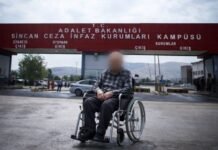
Kurdish politician Selahattin Demirtaş, who has been in prison for almost eight years, is refusing to see visitors because of a new requirement that he submit to a “humiliating body search” before the visits, Turkish Minute reported, citing his lawyer.
Demirtaş’s lawyer, Ramazan Demir, announced on X on Wednesday that he had travelled to Edirne Prison in northwestern Turkey to meet with his client but said Demirtaş did not show up for the meeting due to a new practice requiring him to submit to a body search before every visit.
The lawyer said the Edirne Prison administration came up with the requirement on Wednesday, just weeks before the local elections on March 31, based on an order from the Justice Ministry. Demirtaş is also being ordered to take off his shoes in front of the cameras before and after prison visits.
Demir said since Demirtaş finds the practice “humiliating,” he will never agree to it and as a result will no longer accept visits from his family members, lawmakers and lawyers.
The lawyer also said pro-Kurdish Kurdish Peoples’ Equality and Democracy Party (DEM Party) officials have been informed about the situation and will seek to meet with justice ministry officials to ask them to end the “humiliating” practice.
Prominent human rights activist and lawyer Eren Keskin slammed the body search imposed on Demirtaş on X, saying the government should order body searches for people who kill people in broad daylight, drug traffickers and the murderers of women.
In a similar reaction, the jailed politician refused to attend his father’s funeral earlier this year. Demirtaş had said he would not ask to attend the service as an act of protest against his continued imprisonment and would mourn for his father in his prison cell.
Demirtaş, the most prominent Kurdish politician in Turkey today, has been behind bars since November 2016 on politically motivated charges. He was a vocal critic of the Justice and Development Party (AKP) and its leader, President Recep Tayyip Erdoğan, and challenged Erdoğan in the presidential elections of 2014 and 2018.
He is being held in prison despite four court decisions for his release that were handed down by the European Court of Human Rights (ECtHR) in 2018, the Ankara 19th High Criminal Court in 2019, the Constitutional Court in 2020 and the Grand Chamber of the ECtHR in 2021.














